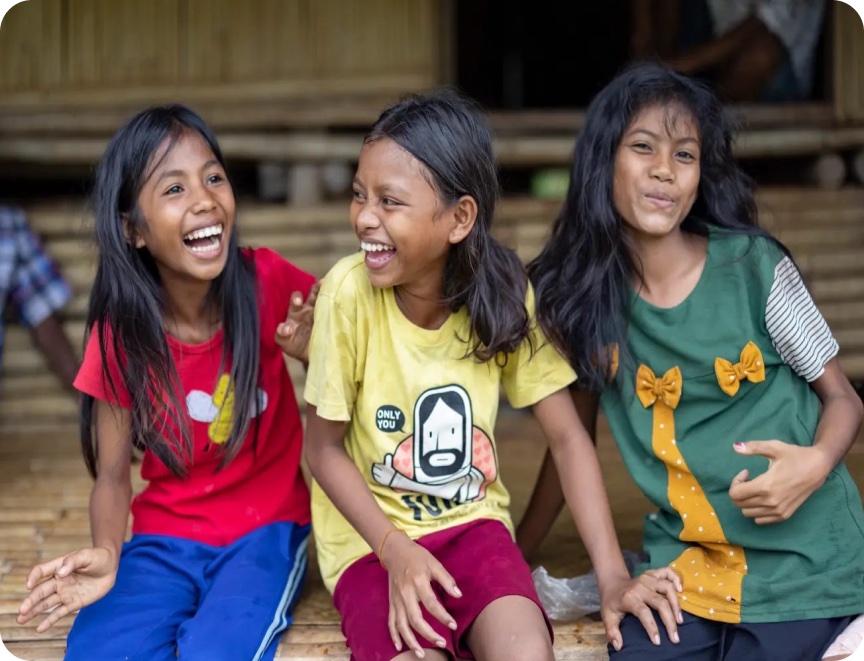ChildFund Australia is an independent international development organisation that works to reduce poverty for children in many of the world’s most disadvantaged communities.
We advocate for children’s rights worldwide and partner with local communities and organisations to create community and systems change which enables vulnerable children and young people, in all their diversity, to assert and realise their rights.
How outdated approaches to regulation harm children and young people and why Australia urgently needs to pivot
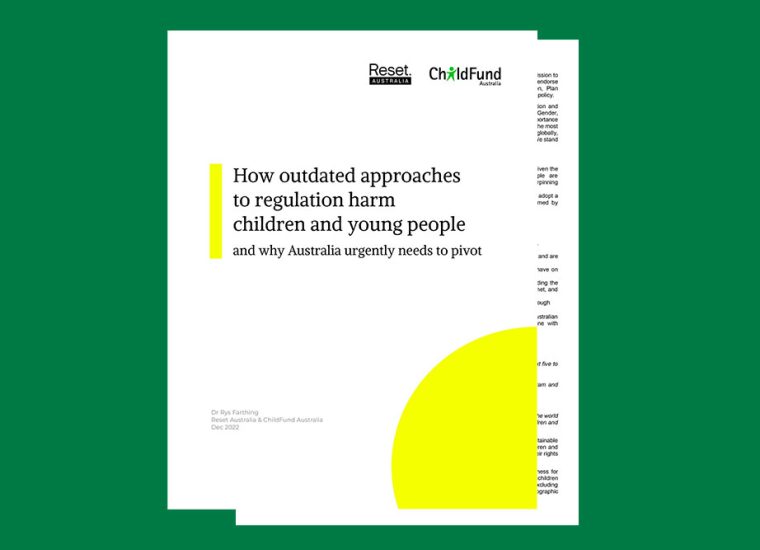
Australia should be the safest place in the world to go online, but it is not. Australia’s reliance on self- and co-regulation has played a big part in this failure. ‘Co-regulation’ allows industry to write their own rules and guidelines — self-regulation in all but name — and has consistently failed Australians.
This is a live policy debate. Co-regulatory frameworks are currently being developed for children’s online safety and could see Australia continue to fail children online. This report documents that:
- Co-regulation does not meet community expectations, and the public overwhelmingly wants regulation drafted by regulators or legislators. A poll of adults found that only 21% trusted the social media industry to write their own codes, and the majority said they would prefer if independent regulators drafted any safety and privacy codes. Likewise, only 14% of teenagers polled said they trusted social media companies to ‘write the rules’.
- Co-regulation demonstrably leads to weaker protections. Exploring the draft online safety codes written by industry for Australia to similar codes written by regulators elsewhere in the world, it becomes apparent that co-regulation offers weaker protection. We document three examples:
- Young people’s accounts must be set to “maximum privacy” up until the age of 18 according to regulator drafted Codes, but only up until the age of 16 according to the proposed industry drafted Codes for Australia. This leaves Australian 16 & 17 year olds less protected
- Children’s precise location data could still be collected in Australia according to the proposed industry-drafted Code, creating real safety and privacy risks. Regulator-drafted Codes elsewhere in the world prevent the collection of unnecessary children’s location data
- Child sexual abuse reporting requirements could be higher in the industry-drafted Code than legislator drafted protections in the UK.
- Co-regulation is inappropriate given the level of risk technology creates, and the behaviour of dominant Big Tech firms. Technology creates significant risks for the Australian community, including public health risks, and there is a track record of ‘undermining’ emerging regulations among the tech sector.
It recommends that the reliance on co-regulation for the technology sector be replaced by the introduction of proper, regulator-drafted regulation.
Submission to the new DFAT International Development Policy by Children and Youth Focused INGOs
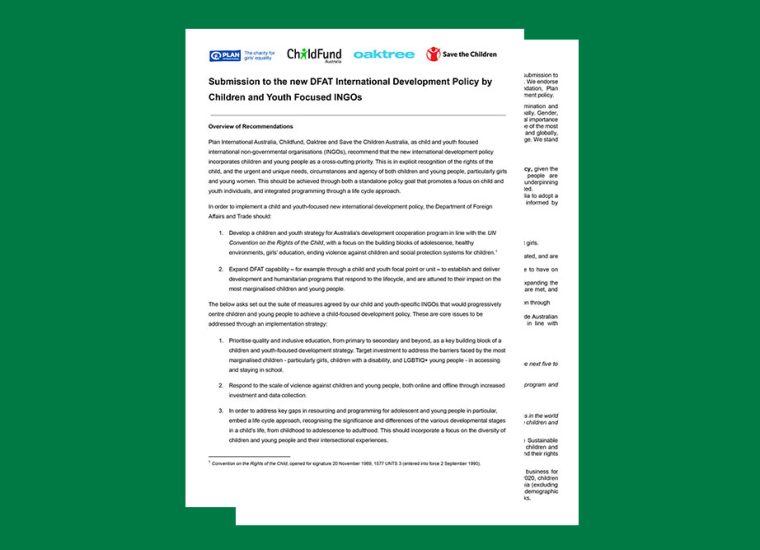
Plan International Australia, Childfund, Oaktree and Save the Children Australia, as child and youth focused international non-governmental organisations (INGOs), recommend that the new international development policy incorporates children and young people as a cross-cutting priority. This is in explicit recognition of the rights of the child, and the urgent and unique needs, circumstances and agency of both children and young people, particularly girls and young women. This should be achieved through both a standalone policy goal that promotes a focus on child and youth individuals, and integrated programming through a life cycle approach.
ChildFund Australia and Plan International Australia welcomes the opportunity to provide a co-authored submission to the Department for Foreign Affairs and Trade’s consultation on the New International Development Policy.
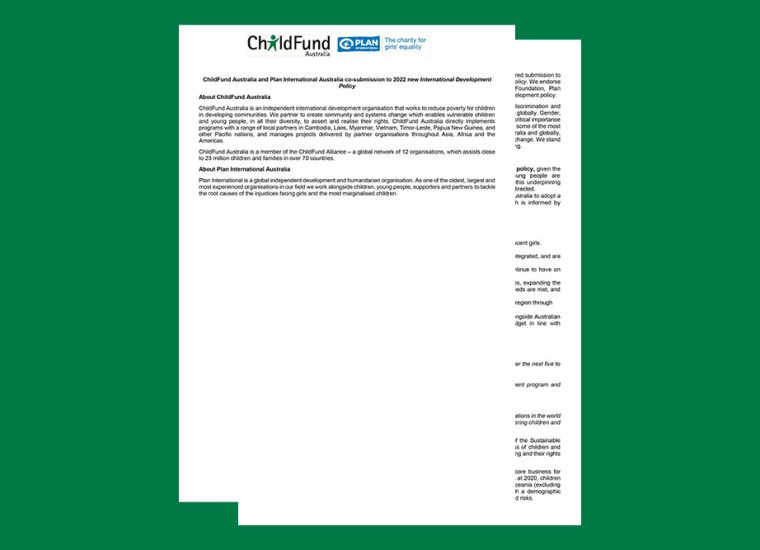
We recognise the ongoing struggle for First Nations justice, the long and continuing history of discrimination and disenfranchisement of First Nations people in Australia, and the marginalisation of Indigenous Peoples globally. Gender, climate, economic and racial justice are not possible without First Nations justice. We recognise the critical importance of the UN Declaration on the Rights of Indigenous Peoples, and that Indigenous children and girls are some of the most marginalised populations when it comes to the realisation of their rights. We recognise that in Australia and globally, First Nations and Indigenous children and young people are leading the fight for justice and systemic change. We stand in solidarity with them and their communities and commit to ongoing learning, deep and active listening.
In addition to the below recommendations, we call for:
Poverty alleviation to be the core purpose of Australia’s new international development policy, given the context of protracted conflict, COVID and climate change, whereby children and young people are disproportionately impacted by the resulting multidimensional poverty. We recommend that this underpinning purpose determine how and where Australia’s support through the aid policy is geographically directed.
Australia’s development policy to be at the heart of our foreign policy, and in doing so, Australia to adopt a feminist approach to all areas of foreign policy, including international development, which is informed by intersectional feminist analysis and in alignment with a First Nations foreign policy.
ChildFund Australia pre-budget submission for the 2022-2023
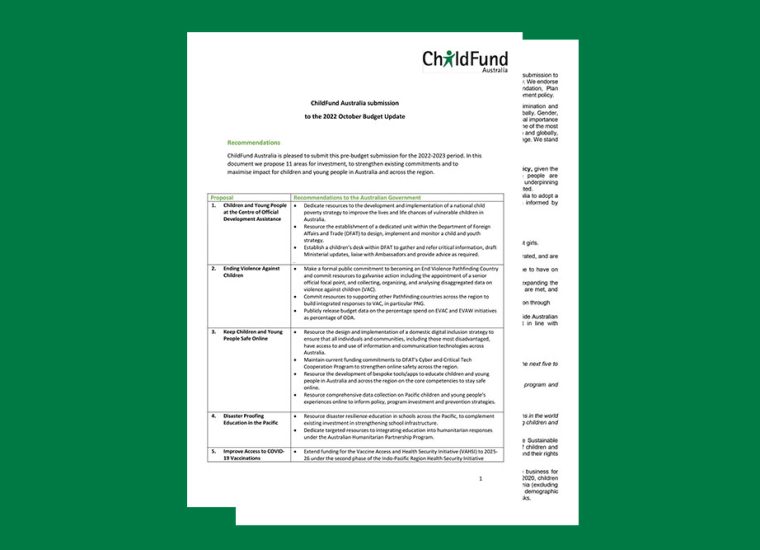
ChildFund Australia is pleased to submit this pre-budget submission for the 2022-2023 period. In this document we propose 11 areas for investment, to strengthen existing commitments and to maximise impact for children and young people in Australia and across the region.



















